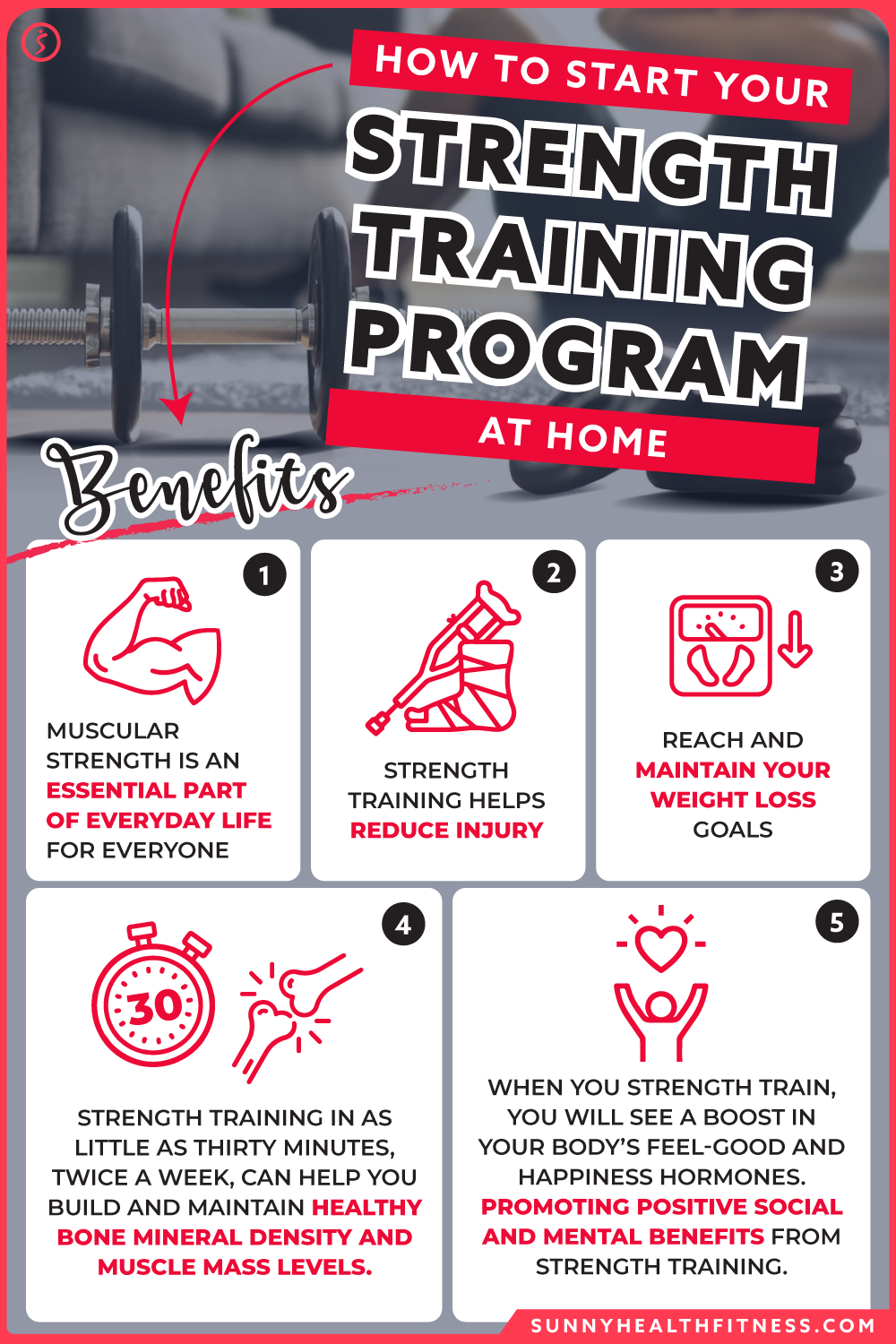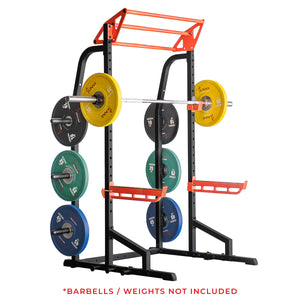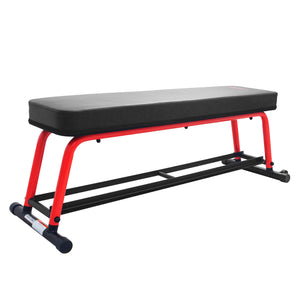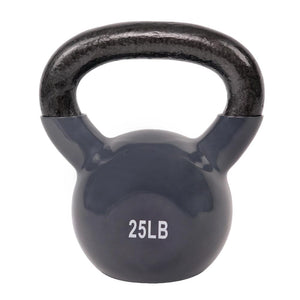Updated on 9/9/2021
Showing up is half the battle. No, it really is. Because once you start something, you will most likely finish it and be happy you did. This quote is incredibly accurate on the subject of strength training programs & working out. The easiest way to start is to show up.
In this article, I will dive into potential benefits you can expect from a well-made strength training program, and guide you through how to start your strength program at home.
Can you do Strength Training at Home?
Yes, you can strength train at home and see great results. Home fitness has come a long way, and gym memberships are not required to achieve the health, fitness, and body you are seeking.
We often associate strength and gaining muscle with lifting weights and becoming bulky. Unfortunately, this sentiment is just not true; in fact, we debunk this myth with our Sunny Trainer Brittany.
Strength training at home consists of performing exercises to help reduce injury while improving physiologically and mentally.
Benefits of Home Strength Training To Get Stronger
1) Why Strength is Essential for Everyone
Muscular strength is an essential part of everyday life. Many of our activities of daily living, such as getting out of bed, getting up off the floor, climbing stairs, and carrying groceries, all require muscle strength to perform.
Humans lose muscle as we age, so it is important to stay proactive with training. Additionally, strength training helps combat many negative consequences of sitting, like poor posture and back pain.
Sitting is unavoidable yet harmful to our bodies when occurring in extended periods, therefore staying consistent with exercise can offset negative sedentary lifestyle effects. While some may think that strength training is only for athletes or weight and powerlifters, strength training is necessary for anyone’s home exercise program.
The good news is, no matter your age, starting a strength training program now will help you get stronger.
2) How Strength Training Protects Your Body
Similarly to muscle, bone density also reduces as we age. Fortunately, it turns out muscle is not the only thing in your body that responds well to strength training. Your bones will also benefit from the additional force placed upon them during your strength training workouts.
Strength training in as little as thirty minutes, twice a week, can help you build and maintain healthy bone mineral density and muscle mass levels.
3) Reach and Maintain Your Weight Loss Goals
Burning calories by participating in cardio-focused exercise is a great way to help you achieve your weight loss goals. Strength training, however, also enables you to reach and maintain your weight loss goals in multiple ways.
The first way happens after your workout. After you strength train, your body requires energy to repair the muscle tissue. This process increases your body’s metabolism and helps you utilize more calories even while you are resting.
The second way strength training enables you to keep the weight from coming back is by increasing muscle mass, known as hypertrophy. When you strength train, your body responds by building new muscle tissue. This muscle tissue is metabolically active, meaning that it requires energy to function.
By increasing the amount of muscle in your body, you increase your calorie-burning potential to lose & maintain your weight.
4) Strength Training Helps Reduce Injury
Stronger muscles will benefit your posture, balance, and coordination. These three crucial benefits are significant for older populations who show a more considerable decrease in muscle mass and are at a greater risk of falling.
Studies have shown that the risk of falling can be reduced by as much as 40% in those who participate in regular strength training compared to those who don’t.
5) Positive Social and Mental Benefits from Strength Training
When you strength train, you will see a boost in your body’s feel-good and happiness hormones. Endorphins are released by your brain when you strength train and will help you increase your energy levels and boost your mood.
Where to Get Started With Your Strength Training at Home
Now that we’ve discussed the many benefits of strength training, you may be wondering what’s the best way to get started. I highly recommend two of our articles that provide an excellent roadmap to get started with your training:
Weight training for the new year and how to start free weight training
We also have a wide selection of follow-along workout videos to help get you started as well. Our YouTube content is an excellent place for a beginner to start to learn the basics. This will help give you an idea of what types of exercises you like and any equipment you may want.
Using the recommendation stated earlier, all you need to do to get started with your strength training program is to set aside 30 minutes twice per week to complete an exercise per major muscle group.
If you are new to strength training, you should aim to complete 2 sets of 15 reps for each exercise. Complete each exercise in order. Rest 30-60 seconds between each set. Check out this example strength endurance program.
Monday
Full Body Workout #1
- Body Weight Squats- 2 sets of 15 reps
- Push Up- 2 sets of 15 reps
- Bent-Over Single Arm Rows - 2 sets of 15 reps
- Chair Dips- 2 sets of 15 reps
- Sit Ups- 2 sets of 15 reps
Thursday
Full Body Workout #2
- Body Weight Lunges- 2 sets of 15 reps
- Incline Couch Push Ups- 2 sets of 15 reps
- Two-Arm Rows- 2 sets of 15 reps
- Single Arm Overhead Press- 2 sets of 15 reps
- Plank- 2 sets of 30-60 seconds
One of the keys to making progress with strength training is to continue to add progressive overload. Progressive overload can be simplified to mean you need to push yourself over time!
If you are not adding a way to overload your muscles progressively, they will stop increasing in size and strength. There are many ways to add progressive overload to your strength training program.
- Increasing the amount of weight you lift while decreasing the number of reps.
- Adding more workout days
- Increase the number of exercises per muscle group
- Change the type of exercises performed
These are just a few of the many ways to ensure that you don’t reach a plateau. If you are curious about what other good strength training workouts and equipment might be a good fit for your strength training journey, check out the workouts on our YouTube channel and some of our strength training equipment on our website.
Click the links below for more great info on strength training.
Upper Body
Lower Body
Total Body
Push-Up
Squat
Deadlift
Row
OH Press



























Add Your Name & Email
Please enter your name and email to continue.We won’t display your email publicly.